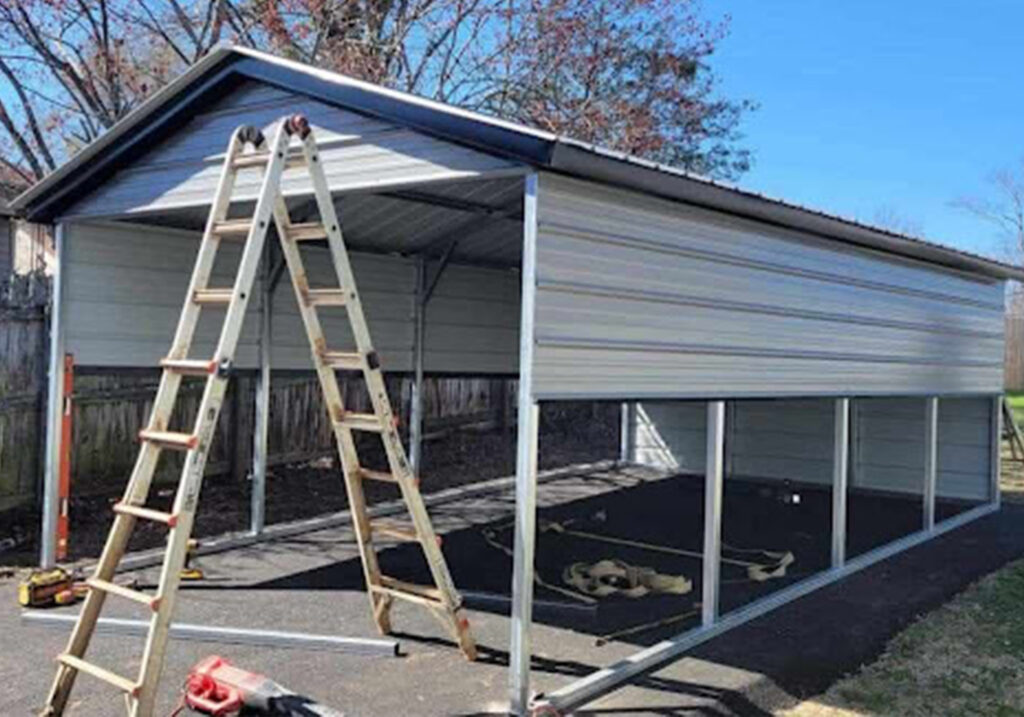As a property owner, you may one day find yourself looking to add a garage to your property. But, if you are on a budget, a carport is an excellent option as well. However, one question that might run into your thoughts is “Will I need a permit to add a metal carport here in my home in North Carolina? What if it is just a very small addition? It’s my property anyway.”
Adding a metal carport to your property in North Carolina is an excellent way to protect your vehicle from the elements, provide extra storage, and even enhance your property’s value.
However, like any construction project, there are important considerations to keep in mind before moving forward. One of the most critical aspects of any home improvement project is ensuring compliance with local laws, including whether or not you need a permit.
In North Carolina, the process for adding a metal carport can vary depending on a range of factors, from the size of the structure to its intended use.
This article will explore the key requirements for obtaining a permit to add a metal carport in North Carolina, including the types of permits required, when they are needed, and the general steps to take to ensure that your project complies with local zoning laws and regulations.
Why Permits Matter for Metal Carports
Before diving into the specifics of North Carolina’s permitting process, it’s essential to understand why permits matter when building a metal carport. The primary purpose of a permit is to ensure that the construction is safe, follows local building codes, and complies with zoning laws. These regulations are designed to protect the homeowner, the community, and the environment. Without a permit, a structure might be unsafe, cause property damage, or even violate local ordinances. Moreover, failure to obtain the necessary permits could result in fines, penalties, or the need to remove the carport after construction is completed.
Obtaining a permit is also important for insurance purposes. If your carport is not properly permitted, your insurance coverage might be compromised in the event of damage or an accident. Additionally, a lack of proper documentation could hinder the sale of your property in the future. Many home buyers prefer to see proper permits in place for any added structures, as it confirms that the installation was done legally and safely.
When Is a Permit Required in North Carolina?
In North Carolina, whether you need a permit for adding a metal carport largely depends on several factors, including the size, location, and type of carport you want to build. Generally, the larger the structure and the more permanent its installation, the more likely it is that you’ll need to obtain a permit. Local zoning laws, building codes, and even neighborhood associations can influence the requirements, so it’s essential to check with the local government or permitting office to get accurate, up-to-date information.
1. Size and Scope of the Carport
In North Carolina, smaller, portable carports (those that do not require a permanent foundation) may not require a permit. These are typically the prefabricated models that can be assembled in a short period and are not intended to be permanently attached to the ground. However, even portable carports can be subject to certain local ordinances, particularly regarding placement and size. If the structure is larger than a typical small carport (for example, if it’s 200 square feet or more), it is more likely that a permit will be required.
On the other hand, larger, more permanent structures, such as carports that are built into the ground or attached to the home, will generally require a building permit. These types of carports often involve a foundation and may require a more detailed inspection of structural safety.
2. Location of the Carport
The location of your carport is another critical factor in determining whether or not a permit is required. Local zoning laws dictate how close structures can be to property lines, roads, and other buildings. For example, if the carport is to be placed in your front yard or too close to a neighboring property line, it may require a variance or additional approval. In residential areas, carports are often required to be set back a certain distance from property boundaries, particularly if the structure is larger or more permanent.
Additionally, if your carport is planned for a flood zone, the local government may have additional requirements to protect against potential flooding or erosion. These could include raising the carport or using specific materials designed for flood-prone areas.
3. Type of Carport
Another factor in determining the need for a permit is the type of carport. Carports that are prefabricated and portable may not require a permit, especially if they do not require a foundation and are installed on an existing driveway or pad. In contrast, custom-built metal carports that involve a more significant construction process, such as poured concrete foundations, electrical work, or plumbing, will almost always require a permit.
Carports that are intended to serve as more than just vehicle storage—such as those with additional enclosed walls or custom features—will likely fall under different building codes and may need additional permits or approvals. If you’re planning to add electricity, water lines, or other utilities to the structure, additional permits will be required, including those for electrical and plumbing systems.
How to Apply for a Permit in North Carolina
The process of applying for a permit in North Carolina generally involves several steps, and it’s essential to understand the requirements before you begin construction. The following are the basic steps you’ll need to take to apply for a permit to build a metal carport:
1. Check with Your Local Government
In North Carolina, permit requirements can vary significantly depending on the county or municipality in which you reside. The first step is to check with your local permitting office, which can usually be found through the county or city government website. Your local office will provide the most accurate and relevant information for your specific location.
You can contact the permitting office directly to ask whether you need a permit for your metal carport. In some areas, the rules may be more lenient, especially for small or portable structures, while other areas may have stricter zoning laws.
2. Submit a Building Permit Application
Once you determine that a permit is required, you will need to submit a building permit application. This process usually requires you to provide detailed plans of the proposed carport, including the dimensions, materials, and the proposed location on your property. Depending on the complexity of your project, you may need to provide additional documentation, such as engineering reports or soil tests.
For more complex projects, a licensed contractor may be required to submit the permit application. In some cases, you may need to pay a fee to cover the cost of processing the application. Once the application is submitted, the permitting office will review your plans to ensure they meet local building codes and zoning laws.
3. Wait for Approval
Once your permit application has been reviewed, the local authorities will either approve or deny your request. If approved, you will receive a permit that allows you to proceed with your construction. If denied, you will be given a reason for the rejection and may be asked to make changes to your plans before resubmitting the application.
4. Schedule Inspections
After receiving approval for your permit and starting construction, you may be required to schedule inspections at different stages of the project. For example, an inspector may need to verify that the foundation is properly installed or that electrical work complies with safety standards. The number and type of inspections required will vary based on the complexity of the project and the regulations in your area.
Consequences of Not Obtaining a Permit
Failing to obtain a permit for your metal carport can lead to a number of negative consequences. If caught, you may be fined or ordered to remove the structure entirely. Additionally, without a permit, your carport may not be covered by your homeowner’s insurance policy in the event of an accident or damage. This could result in out-of-pocket expenses for repairs or replacement.
Not having the proper permit can also affect your ability to sell your home in the future. If you decide to sell your property, potential buyers or real estate agents may notice the unpermitted structure during the inspection process. If it is found that the carport was built without a permit, the sale of your home could be delayed or halted entirely.
Conclusion
Obtaining a permit may be complex and a time-consuming activity, considering that you own the property. While you think you can do anything you want with it because it is yours, you would still need to get a permit if you want to make an addition. Keep in mind that it is necessary to comply with North Carolina’s regulations and zoning laws.
It is your responsibility to ensure that your carport is built legally and safely. Failing to do so could result in fines, delays, or complications down the road, so it is always best to err on the side of caution and obtain the necessary permits before starting your project.

